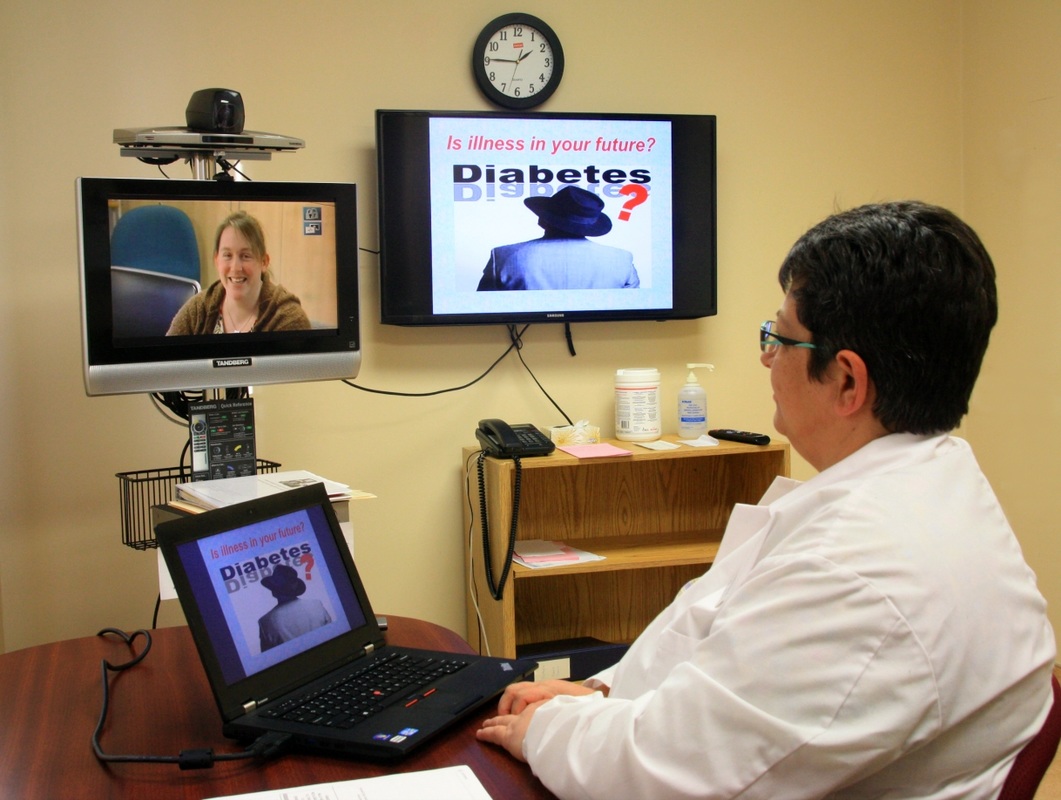| Keith Steeves didn’t realize the insomnia, nightmares and anxiety attacks that plagued him following his return from active duty in war-torn Bosnia in 1993 actually had a name. And he certainly wasn’t aware of the help he would find within his own community. Three years ago, Steeves was diagnosed with Post-Traumatic Stress Disorder, or PTSD, a stress-related condition common to military personnel who have served in the line of fire. Part of his treatment plan would have required monthly trips to a specialist in Fredericton, however, thanks to Telehealth video conferencing facilities located at the Albert County Health & Wellness Centre, he was able to meet with his doctor without the expense of travel. |
Telehealth is a valuable service made available through the Horizon Health Network that provides patients and physicians with audio-visual meeting spaces for health care not requiring physical exams.
“The whole idea of Telehealth is that we want to eliminate geography and increase access to the scarce clinical resources we have in our province,” says Krisan Palmer, Horizon’s regional Telehealth manager and clinician in Moncton.
“This technology allows patients to access specialists or physicians from other cities, provinces or outside the country, without leaving their own community,” says Angela Lawson, Video Conference Operations Coordinator. “It can reduce wait times and mean significant savings for patients in terms of time and travel costs.”
How it works
Lawson sets up the appointment between the physician and the patient. The patient goes to the Albert Health and Wellness Centre for the appointment and is shown to a private room. Audio/visual equipment allows the physician and patient to connect through a secure network, as if they were in the same room.
“The quality is excellent, much better than Skype,” says Steeves. “It saved me 18 or 20 trips to Fredericton. I recommend this to anyone who doesn’t need a physical exam.”
In some cases, an additional exam camera and services of a nurse on site allow the physician to conduct examinations, assess vitals, or acquire specimens for further testing.
Lawson says the system is most commonly used for initial consultations or follow-up appointments after surgery and would be of particular value to parents of children receiving treatment at the Halifax IWK Hospital or the Toronto Sick Children’s Hospital.
“Some of our users are patients of the IWK Genetics lab, who wish to do genetic testing for breast cancer, or plastic surgery patients who must be seen every three months or so, ” she notes. “We do rehabilitation sessions with the Stan Cassidy Centre in Fredericton, appointments with organ transplant specialists in Ontario, or general surgery follow-ups.”
Added benefits
The service also benefits employees at the Albert County Health and Wellness Centre who use it for educational events and meetings, saving the travel to Moncton or further afield. Physicians at The Moncton Hospital use it to consult with colleagues, and for education sessions.
Unfortunately, many doctors don’t know it exists, so it is often up to the patient to ask. Lawson hopes that eventually more will take advantage of the service, but for now, she encourages patients to ask their physicians if video conferencing is an option for them. “Right now, people might travel to Moncton on a regular basis for a 10 or 15 minute appointment with a specialist.”
Steeves feels fortunate to have such a valuable service in Albert County and wishes more people knew about it. “If it became more commonplace – especially to access specialists from outside our region – it could save people and the healthcare system so much money.”
For more information regarding the availability of Telehealth services, patients and physicians may contact their local health centre or call Krisan Palmer, Telehealth Clinical Coordinator at 506-648-6042.
Article written by Deborah Carr. Deborah is a freelance writer and an ardent supporter of ''all things Albert County." www.deborahcarr.ca

 RSS Feed
RSS Feed